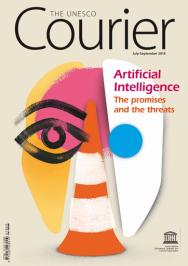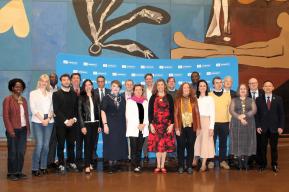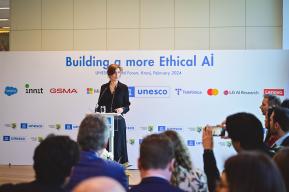مقال
من أجل الأفضل، لا غير. لِمَ لا؟

يُكرّس كارل شرودر وقته للقراءة، والدراسة، والتأمّل وتصوّر قصص مستقبلية. هو كاتب في الخيال العلمي ذاع صيته عالميا، يستوحي من مؤلفاته خبراءُ التكنولوجيا الحديثة والذكاء الاصطناعي. كما يضع خياله في خدمة المؤسسات والحكومات لاستباق تحوّلها التكنولوجي والاقتصادي والاجتماعي. بالنسبة لهذا الروائي والكاتب الكندي، يندرج الذكاء الاصطناعي ضمن ثورة ثقافية أكثر منه ضمن ثورة تكنولوجية، ممّا يقتضي تفكيرا في المسائل المتصلة بالأخلاقيات، والحوكمة والتشريع.
كارل شرودر يُجيب عن أسئلة ماري-كريستين بينو-ديمولان (اليونسكو)
علاوة عن ولَعك بالإبتكارات الرقمية والتكنولوجية، ما هي مصادر إلهامك؟
أكرّس جزءا هامّا جدا من وقتي لقراءة مؤلفات كبار الفلاسفة. وهذا من شأنه أن يوفر لي نظرة شاملة ويتيح لي تصوّر الصلات الممكنة بين التكنولوجيا والتحرّكات الإجتماعية. وحتى تطمئني، أؤكد لك أنني أخصص نفس القدر من العناية لعرض الأحداث حتى تكون مؤلفاتي مُسلّية.
كما أن الإنترنت يمثّل مصدرا لا نهاية له للمعلومات والتسلية. وكل إبحار في الشبكة هو فرصة لاكتشافات جديدة قد تحثني على إعادة التفكير أو حتى على التغيير الجذري لكل ما انتهيت من كتابته. إن الإنترنت يسهّل عليّ حقا البحث، ولا أحتفظ إلّا على أفضل ما يحتويه.
هل ترى أن الذكاء الإصطناعي قد يحلّ يوما محلّك كمؤلف؟
لحد الآن، أعتبر أن مساهمة الذكاء الاصطناعي في مجالي هي أقرب للوظيفة العشوائية، تُشبه لعبة الورق التي لا تنتهي، حيث تُمثّل كل ورقة شخصية أو مشهدا، الخ. مثلا، قد تقوم ورقة من هذه اللعبة بدور «ملك الأشرار الذي يقيم في برج»، ومن هنا، يُمكن لي صياغة شخصية وحبك تسلسل الأحداث.
أعتقد أن الإبداع سوف ينبثق، يوم ما، من خارج الإنسان. هذا من باب الممكن. ولا أستغرب إذن أن يُصبح الذكاء الإصطناعي قادرا على تأليف كتاب قيّم، ولكن ليس في الشكل الحالي المألوف للكتب. سوف تتولى القيام بذلك أصناف أخرى من الآلات لم يتمّ التفكير فيها بعد. إن الحواسيب الحالية لا تُنتج المعاني، وتدخّل الإنسان لا يزال ضروريا في العملية الابداعية، حتى وإن تبلورت النظم التكنولوجية واقتربت من المهارات البشرية.
في مشهد من روايتي «ليدي أوف مايزس» (2005)، يختلّ الذكاء الإصطناعي ويبتكر ما يشبه قنبلة خلّاقة تقوم بنشر روايات ذات قيمة استثنائية، بكمّيات خياليّة، لحد أنه يستحيل قراءة جميعها ولو في غضون مجموع أعمار البشرية! وماذا عسى أن يكون رد فعل البشر أمام هذا الحدث؟ لا شيء سوى التأقلم معه ومواصلة ابداعاتهم.
لنتخيّل انفجار هذه القنبلة الخلّاقة في يومنا هذا. لأي سبب يمنعني ذلك من مواصلة تأليف كتب جديدة؟ لماذا يجب أن أضع نفسي «أنا ضد مليون كتاب» بدل من «أنا مع مليون كتاب»؟ أنا أعتبر الإبداع، مهما كان مصدره، إضافة في وجودنا وليس طرحا منه.
في الحقيقة، إن مفهوم التعويض ملتصق بمفهوم القيمة. من الممكن اعتبار كل شيء قابلا للتعويض، وفقا لقيمة مُعيّنة. وباعتِباري كاتبا، قد يحصل يوما أن يتم تعويضي بحاسوب يُحقّق نجاحا تجاريا أكثر منّي. لكن هذا المنطق لا يستوي إلا في حال تحقيق النجاح التجاري ضمن منظومة القيمة.
ليس لديك، إذن، أية خشية من الذكاء الاصطناعي؟
إن تحديد ما إذا كان الذكاء الاصطناعي تهديدا أم نفعا يعود حصرا لمسؤولية الإنسان. انتشرت الكثير من الأفكار الضيقة حول الذكاء الإصطناعي، وحول نظام تشغيله ومخاطره المحتملة بالنسبة للبشرية. بل ويمكن حتى الحديث عن مزايدات مُثيرة للقلق حول فقدان السيطرة على الآلة. وفي المرحلة التي نمرّ بها اليوم، هذا التفكير غير سليم.
في المقابل، لا بد من اختيار الاتجاه الذي يجب أن يتبعه الذكاء الاصطناعي وتحديد استعماله. وإذا ما قررنا الاستثمار في الآلات العملاقة لشن الحروب الاقتصادية أوالسياسية، نكون قد سلكنا، دون شك، طريقا مُؤدّية إلى محيط عدائي. وعلى المجتمع أن يتّخذ القرارات الصالحة عند تطبيق الذكاء الإصطِناعي.
وإن حلّ يوم تصبح فيه منتجات الذكاء الاصطناعي مُستقلّة عن إرادتنا، فسوف تكون مثل الأبناء الذين يُغادرون والديهم، ليعيشوا حياتهم! إن مسؤوليتنا كأولياء تكمن في حسن تربيتهم وفي تعليمهم القيم الإيجابية. تلك هي حجرة الزاوية عند التفكير في الموضوع.
ألا يلتقي ذلك مع إشكالية الأخلاقيات؟
بالتأكيد، لقد بدأ الخيال العلمي في التفكير في ذلك منذ قرن! في حين لم يُفكّر فيه أصحاب القرار السياسي والمجتمع إلّا الآن. ونظرا لغياب الاهتمام الجدّي بالموضوع، كلّما نشأ ابتكار تكنولوجي هام إلا وشعرنا بأنه خارج عن سيطرتنا. رغم أن الحلّ بسيط: يجب ألا نُقرّر تطبيق أي ابتكار تكنولوجي إلّا بعد التحقق من تأثيره على المجتمع، والتحكيم في استعماله، وضبط التشريعات المناسبة.
لقد تناولت هذا الرهان في« ليدي أوف مايزس» وجعلت منه أحد مقاصد الرواية حيث دعوت إلى التخطيط لتطبيق كل ابتكار تكنولوجي لاستباق التغيّرات المجتمعية.
ما هي الرسالة التي ستوجّهها في كتابك القادم؟
سوف أتطرّق دون شك لمستقبل السياسة وطريقة اتخاذ القرار، وكذلك للوسائل التكنولوجية التي قد تقودنا إلى مستوى حضاري آخر.
قررت الكتابة بالقلم، وفي ذلك إشارة مازحة! سوف يكون استعمال القلم تجربة مثيلة بسائر ما توفره الوسائل الرقمية. يجب التمييز بين الكتابة ووسيلة الكتابة. إن التكنولوجيا ليست سوى وسيلة ولا بد من إعادتها إلى وضعها الصحيح. لا شيء فينا ولا في ما نُريد أن نكون، يستلزم أن نتخلى عنه، علينا فقط أن نستعدّ جماعيّا.
Karl Schroeder, interviewed by Marie Christine Pinault Desmoulins (UNESCO)
Besides your passion for digital and technological innovations, what are your sources of inspiration?
I devote a substantial part of my time to reading great philosophers. This allows me to have an overview, to consider the possible connections between technologies and societal movements. But, let me reassure you, I give just as much attention to the plot, so that my books are entertaining!
At the same time, the internet is an infinite source of information and distraction. Any navigation on the network is an opportunity for new discoveries that may encourage me to rethink, or even to change radically, everything I have just written. The internet really makes my research easier and I take only the best from it.
Do you foresee that AI could one day replace you as a writer?
At this time, I would equate the contribution of AI in my field to a randomization function, comparable to laying out a deck of cards, each of which could define a character, a scene, etc. For example, one of them could be “the king of the bad guys, he is next to a tower" and from there, I could develop a character, a plot.
I believe that creativity could eventually happen outside of human beings. So I can imagine that AI will be able to create a book worthy of the name, but certainly not in its current form. These will be different kinds of machines, which we have not yet thought up. Today’s computers do not produce meaning, and human intervention is always necessary in the creative process, even if technological devices are becoming more refined and approaching human capabilities.
In my novel, Lady of Mazes, there is a scene where AI is going insane and sets up a kind of creativity bomb that fuels millions and millions of novels of exceptional quality, literally too many for people to read in all their collective lifetimes! And so, what happens to humans? Well, they adapt and continue their own creation.
Imagine that this creative bomb were to explode today. Why would that prevent me from continuing to write new books? Why should I think “me against a million books” and not “me and a million books?” I consider creativity – whatever its origin – an addition, and not a subtraction, to our own existence.
In fact, the notion of replacement is inherent in the concept of value. We could consider that everything can be replaced, according to a given value. As a writer, I could be replaced by a computer that has more commercial success than me. But this reasoning is only valid if commercial success prevails in the value system.
Does this mean you have no apprehensions about AI?
Determining whether AI is a threat or a benefit is entirely a human responsibility. There are many simplistic ideas about AI, how it works, and why it could be a threat to humanity. One could even say that there is an exaggerated anxiety focused on losing control of the machine. At the stage where we are today, this is not an effective way of thinking.
On the other hand, it is imperative to choose the direction that AI will take and to decide how it will be used. If we decide to invest in supermachines for economic or political warfare, we are taking the path of building a hostile environment, of course. Society must make the right decisions for the implementation of AI.
If one day the products of AI become independent of us, they will be like the children who leave us when the time comes, to lead their own lives! Our responsibility as parents is to nurture them and to instil positive values. This is the cornerstone of the argument.
Is this related to the question of ethics?
Yes, science fiction has been thinking about all this for a century! Policymakers and society are only just beginning to think about these issues. It’s because we aren’t seriously examining the subject that we resort to free-wheeling every time a major technological innovation is introduced. Even so, the solution is simple – we must decide to implement a new technology only after having identified its social impact, determined its use and legislated accordingly.
I made this issue one of the messages in Lady of Mazes – to encourage us to plan the implementation of any technological innovation, to better anticipate societal changes.
What will be the message of your next book?
It will undoubtedly deal with the future of politics and decision-making processes, and also the technological means that could take us to another level of civilization.
That’s a joke, but I am thinking of writing it with a pen! It will be an experiment of use, just like the ones that digital tools offer us. We must be able to distinguish writing from the means of writing. Technology is only a means, and it must be put back in its proper place. There is nothing we need to give up about what we are or what we want to be – we only have to prepare ourselves collectively.
Karl Schroeder
A science fiction novelist, essayist and futurist, Karl Schroeder (Canada) is the author of ten novels, translated into as many languages. They include Ventus (2000), Permanence (2002), Lady of Mazes (2005), Crisis in Zefra (2005) and Lockstep (2014). He received the Netexplo Talent Prize at UNESCO in February 2018.








